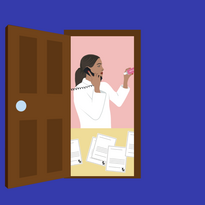Hannah

Hannah has had recurrent thrush for two years. She has seen numerous healthcare professionals and has been swabbed for thrush multiple times. She has tried longer-term antifungal prescriptions but found these difficult to stick to and not that helpful. Hannah plans to investigate the connection between her IUD and recurrent thrush.
Hannah is a straight woman. She works as a support worker. Her background is white British. Interview clips read by an actor.
More about me...
Hannah has experienced recurrent thrush for the past two years. Her symptoms include discomfort, itchiness, and a “cottage cheese discharge”.
Recurrent thrush has impacted Hannah’s daily life, including her mood and intimate relationships. Hannah said she felt “frustrated, cross, angry, and teary”. She says sex has become “off-putting” due to both her and her partner getting thrush which made her feel “undesirable”. Further, Hannah had to relay her plans to get pregnant, as this was not recommended while taking her antifungal tablets (fluconazole).
Looking for help, Hannah saw general practitioners (GP), nurses, and gynaecologists. She read on thrush medication packages that if thrush occurred three or four times a year to see her GP so that is what she did. However, Hannah was frustrated to hear from a nurse that recurrent thrush was just something to accept and live with. Hannah visited the doctor often and said the receptionist began to recognise her. She had a good relationship with her regular GP before they left the practice.
Hannah said it was frustrating to have to test for thrush three or four times to prove it was recurrent thrush. After being swabbed by healthcare professionals, Hannah asked to perform the swab herself which she preferred. Hannah also wanted to know what type of thrush she had and whether it was resistant to treatment. After her GP did not offer this test, Hannah paid for a test privately to determine whether it was resistant to treatment, which it was not.
In terms of treatment, Hannah was prescribed a six-month course of antifungal tablets (fluconazole). However, she found this hard to remember to take regularly and it did not stop her symptoms. She only completed three months of the course before stopped. She was then prescribed a three-month course of antifungal tablets. After that, she decided to use antifungal tablets as needed instead of weekly. At the time we spoke, her male partner was also given antifungal medication (fluconazole) as her gynaecologist thought they could be passing thrush back and forth to each other.
Hannah also tried other options like taking probiotics, cutting out alcohol from her diet, and practicing yoga to be healthier. She enjoys wild swimming and wondered if this was contributing to recurrent thrush.
Hannah said that discussing recurrent thrush with her Polish family was difficult due to perceived judgmental attitudes. However, she was able to be more open with her friends, family, and work colleagues in England.
Looking forward, Hannah said she felt “disillusioned” and “fed up”. She emphasized the need for healthcare professionals to provide more information and for patients to be assertive in seeking care. Hannah had read that her coil birth control could contribute to thrush, and she planned to investigate this further.
Hannah felt that her pelvic examination had helped demonstrate the “gravity” of the situation (read by an actor)
Hannah felt that her pelvic examination had helped demonstrate the “gravity” of the situation (read by an actor)
I preferred the self-swabbing. I’d always choose self-swabbing between the two if given the option, but I did believe that it was necessary the first time for the nurse to see it because she saw the gravity of it, because I had like red skin and it was quite, you know, inflamed, that’s the word I’m looking for, so I think once she saw the gravity of it, it sort of clicked that I wasn’t just complaining, it wasn’t just a routine thing, it’s actually quite an annoying thing.
Hannah was frustrated to have to provide multiple swabs to be diagnosed with recurrent thrush (read by an actor)
Hannah was frustrated to have to provide multiple swabs to be diagnosed with recurrent thrush (read by an actor)
I’ve had it on and off for about two years and it was very frustrating because every time I went to my doctor, they expected... to have... nearly every time it... till, I think three times, or four times, I can’t remember, they expected to have a swab to confirm that it was thrush, which was infuriating because I knew it was what it was, and then till eventually they said... well, the secretary even recognised me... and the GP’s admin recognised... got to know me because I was calling about it.
Hannah found it difficult to remember taking medication weekly and had “given up” (read by an actor)
Hannah found it difficult to remember taking medication weekly and had “given up” (read by an actor)
I’m a bit ditsy, I shouldn’t... not ditsy, but forgetful... I’m a bit forgetful, and because it’s a daily medication, so I’ve put a reminder in my phone, I did put a reminder in my phone, but after seeing... I’m just a bit... like I said, I’m a bit disillusioned now, so I’ve sort of given up on taking a long course; maybe I should try again now that partner has... because that was frustrating as well, but... yeah.
With the... with the six-month one, and then I just thought, ‘well, it’s coming back,’ you know, I thought it should be able to go away after three months, and that was very frustrating. I mean I have thought about just asking again and doing a six-month course again, but you just sort of give up a bit; it sounds a bit silly, but I need to... I do need to try again.

